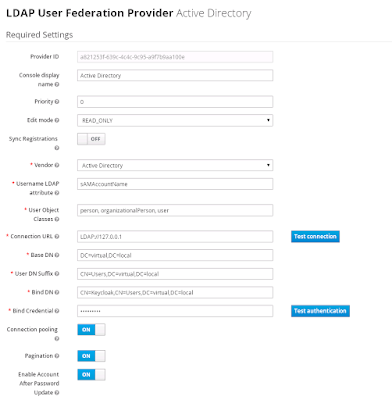Configuring Wildfly for HTTPS in a post Poodle world
If you have ever run into “ssl_error_no_cypher_overlap” errors trying to configure Wildfly to use HTTP then you have probably cursed the lack of decent documentation for configuring Wildfly now that browsers have disabled a lot of insecure SSL cyphers. This is how I got around the problem.
First you need a self signed key. This can be created with the command:
keytool -genkey -alias mycert -keyalg RSA -sigalg SHA256withRSA -keystore my.jks -storepass secret -keypass secret -validity 9999
Then you need to configure Wildfly to accept a list of known cyphers. Mozilla has a nice list of cypher codes for high security, compatibility etc at https://wiki.mozilla.org/Security/Server_Side_TLS#Modern_compatibility.
The problem is that this list has the OpenSSL key names, and Wildfly needs the RFC names. So you need to map one to the other using the table at https://testssl.sh/openssl-rfc.mappping.html.
What I ended up with was this list, defined in a enabled-cipher-suites attribute. This list is the Modern Compatibility list. This is added to the <subsystem xmlns="urn:jboss:domain:undertow:2.0"> element.
<https-listener name="https" socket-binding="https" security-realm="UndertowRealm" enabled-cipher-suites="TLS_ECDHE_RSA_WITH_AES_128_GCM_SHA256,TLS_ECDHE_ECDSA_WITH_AES_128_GCM_SHA256,TLS_ECDHE_RSA_WITH_AES_256_GCM_SHA384,TLS_ECDHE_ECDSA_WITH_AES_256_GCM_SHA384,TLS_ECDHE_RSA_WITH_AES_128_GCM_SHA256,TLS_DHE_DSS_WITH_AES_128_GCM_SHA256,TLS_ECDHE_RSA_WITH_AES_128_CBC_SHA256,TLS_ECDHE_ECDSA_WITH_AES_128_CBC_SHA256,TLS_ECDHE_RSA_WITH_AES_128_CBC_SHA,TLS_ECDHE_ECDSA_WITH_AES_256_CBC_SHA,TLS_ECDHE_RSA_WITH_AES_256_CBC_SHA384,TLS_ECDHE_ECDSA_WITH_AES_256_CBC_SHA384,TLS_ECDHE_RSA_WITH_AES_256_CBC_SHA,TLS_ECDHE_ECDSA_WITH_AES_256_CBC_SHA, TLS_DHE_RSA_WITH_AES_128_CBC_SHA256,TLS_DHE_RSA_WITH_AES_128_CBC_SHA,TLS_DHE_DSS_WITH_AES_128_CBC_SHA256,TLS_DHE_RSA_WITH_AES_256_CBC_SHA256,TLS_DHE_DSS_WITH_AES_256_CBC_SHA,TLS_DHE_RSA_WITH_AES_256_CBC_SHA" />
You then need to configure the self signed key with this. It goes under the <management><security-realms> element.
<security-realm name="UndertowRealm"> <server-identities> <ssl> <keystore path="my.jks" relative-to="jboss.server.config.dir" keystore-password="secret" alias="mycert" key-password="secret"/> </ssl> </server-identities> </security-realm>
First you need a self signed key. This can be created with the command:
keytool -genkey -alias mycert -keyalg RSA -sigalg SHA256withRSA -keystore my.jks -storepass secret -keypass secret -validity 9999
Then you need to configure Wildfly to accept a list of known cyphers. Mozilla has a nice list of cypher codes for high security, compatibility etc at https://wiki.mozilla.org/Security/Server_Side_TLS#Modern_compatibility.
The problem is that this list has the OpenSSL key names, and Wildfly needs the RFC names. So you need to map one to the other using the table at https://testssl.sh/openssl-rfc.mappping.html.
What I ended up with was this list, defined in a enabled-cipher-suites attribute. This list is the Modern Compatibility list. This is added to the <subsystem xmlns="urn:jboss:domain:undertow:2.0"> element.
<https-listener name="https" socket-binding="https" security-realm="UndertowRealm" enabled-cipher-suites="TLS_ECDHE_RSA_WITH_AES_128_GCM_SHA256,TLS_ECDHE_ECDSA_WITH_AES_128_GCM_SHA256,TLS_ECDHE_RSA_WITH_AES_256_GCM_SHA384,TLS_ECDHE_ECDSA_WITH_AES_256_GCM_SHA384,TLS_ECDHE_RSA_WITH_AES_128_GCM_SHA256,TLS_DHE_DSS_WITH_AES_128_GCM_SHA256,TLS_ECDHE_RSA_WITH_AES_128_CBC_SHA256,TLS_ECDHE_ECDSA_WITH_AES_128_CBC_SHA256,TLS_ECDHE_RSA_WITH_AES_128_CBC_SHA,TLS_ECDHE_ECDSA_WITH_AES_256_CBC_SHA,TLS_ECDHE_RSA_WITH_AES_256_CBC_SHA384,TLS_ECDHE_ECDSA_WITH_AES_256_CBC_SHA384,TLS_ECDHE_RSA_WITH_AES_256_CBC_SHA,TLS_ECDHE_ECDSA_WITH_AES_256_CBC_SHA, TLS_DHE_RSA_WITH_AES_128_CBC_SHA256,TLS_DHE_RSA_WITH_AES_128_CBC_SHA,TLS_DHE_DSS_WITH_AES_128_CBC_SHA256,TLS_DHE_RSA_WITH_AES_256_CBC_SHA256,TLS_DHE_DSS_WITH_AES_256_CBC_SHA,TLS_DHE_RSA_WITH_AES_256_CBC_SHA" />
You then need to configure the self signed key with this. It goes under the <management><security-realms> element.
<security-realm name="UndertowRealm"> <server-identities> <ssl> <keystore path="my.jks" relative-to="jboss.server.config.dir" keystore-password="secret" alias="mycert" key-password="secret"/> </ssl> </server-identities> </security-realm>

Comments
An Thái Sơn với website anthaison.vn chuyên sản phẩm máy đưa võng hay máy đưa võng tự động tốt cho bé là địa chỉ bán máy đưa võng giá rẻ tại TP.HCM và giúp bạn tìm máy đưa võng loại nào tốt nhất hiện nay.